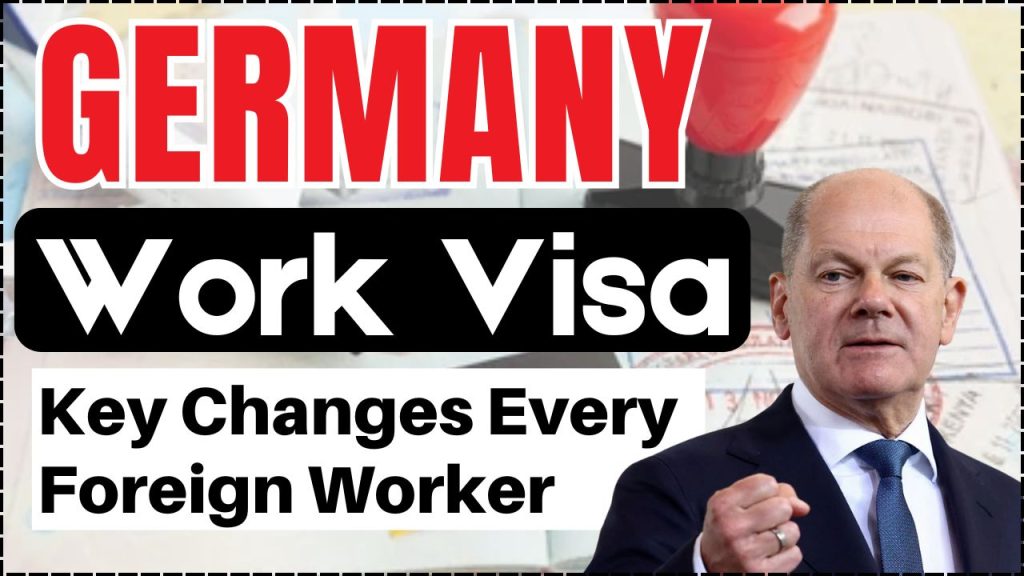
Germany has implemented significant changes to its work visa system in 2025, creating new pathways for international talent to enter the German job market. These reforms aim to address critical labor shortages while streamlining processes for qualified professionals seeking employment opportunities in Europe’s largest economy.
Major Reforms Transforming Germany’s Immigration Landscape
The German government has introduced comprehensive reforms to its immigration framework, specifically targeting skilled workers from non-EU countries. These changes represent the most substantial overhaul of Germany’s work visa system in recent years, creating more accessible pathways for international professionals.
The Opportunity Card: Job-Seeking Without Prior Employment
One of the most revolutionary additions to the Germany Work Visa 2025: Key Changes Every Foreign Worker Should Know is the introduction of the Opportunity Card (Chancenkarte). This innovative points-based system allows qualified professionals to enter Germany to search for employment without requiring a job offer beforehand.
| Opportunity Card: Points System Categories | Maximum Points Available |
|---|---|
| Qualification/Degree | 25 points |
| Professional Experience | 20 points |
| German Language Proficiency | 20 points |
| Age (Under 35) | 15 points |
| EU Language Proficiency (non-German) | 10 points |
| Connection to Germany | 10 points |
| Minimum Required for Approval | 65 points |
Applicants must score at least 65 points across these categories to qualify. The Opportunity Card grants a 12-month stay for job seeking and allows part-time work of up to 20 hours weekly during the search period.
Revised EU Blue Card Requirements
The EU Blue Card program has undergone significant adjustments to become more accessible to a broader range of professionals. The salary thresholds have been strategically lowered to attract talent in high-demand sectors.
| EU Blue Card Category | 2025 Annual Salary Threshold |
|---|---|
| General Professions | €48,300 |
| Shortage Occupations (IT, Healthcare) | €43,760 |
| Recent University Graduates | €37,900 |
These revised thresholds represent a reduction from previous requirements, making the Blue Card accessible to a wider pool of international professionals.
Fast-Track Processing for Critical Sectors
To address urgent workforce needs in specific industries, Germany has implemented an expedited processing system for certain occupations.
| Industry Sector | Typical Processing Time | Fast-Track Processing |
|---|---|---|
| Healthcare | 3-4 months | 4-6 weeks |
| Information Technology | 3-4 months | 4-6 weeks |
| Engineering | 3-4 months | 6-8 weeks |
| Scientific Research | 3-4 months | 6-8 weeks |
Applicants in these fields benefit from priority processing and reduced documentation requirements.
Digital Transformation of Application Procedures
Germany has overhauled its application infrastructure with a new digital platform that streamlines the entire visa process. This system allows applicants to:
- Submit all documentation electronically
- Track application status in real-time
- Receive automated updates on processing milestones
- Schedule appointments with relevant authorities
- Access personalized guidance based on your qualification profile
This digital transformation has reduced average processing times by 40% compared to the previous system, significantly improving the applicant experience.
Recognition of Foreign Qualifications
The recognition of foreign credentials remains a cornerstone of Germany’s immigration system, with important updates to the recognition process in 2025.
| Qualification Type | Recognition Authority | Typical Processing Time |
|---|---|---|
| University Degrees | Central Office for Foreign Education (ZAB) | 2-3 months |
| Vocational Qualifications | Chambers of Industry and Commerce (IHK) | 3-4 months |
| Healthcare Professionals | State Health Authorities | 4-6 months |
| Engineering Qualifications | Federal Employment Agency | 3-4 months |
Pre-approval of qualifications is now possible before entering Germany, allowing applicants to begin the recognition process from their home countries.
Language Requirements Flexibility
The 2025 reforms have introduced more flexible language requirements for certain categories of workers.
| Visa Category | Previous Requirement | 2025 Requirement |
|---|---|---|
| General Employment Visa | B1 German | A2 German |
| EU Blue Card | B1 German | No requirement* |
| Opportunity Card (Basic) | B1 German | A1 German |
| Opportunity Card (Maximum Points) | B1 German | B2 German |
For EU Blue Card: No language requirement at entry, but A1 level required within 24 months for permanent residency path.
Key Takeaways
The changes to Germany‘s work visa system in 2025 represent a strategic shift toward a more open, flexible immigration framework designed to attract global talent. By streamlining processes, creating new entry pathways, and reducing bureaucratic barriers, Germany has positioned itself as an increasingly attractive destination for international professionals.
Potential applicants should thoroughly research these new opportunities and determine which pathway best aligns with their qualifications and career goals. With proper preparation and understanding of these new systems, foreign workers can successfully navigate Germany’s revamped immigration landscape in 2025.

Katherine Johnson is a passionate writer with a keen interest in storytelling, content creation, and creative expression. She enjoys exploring diverse topics and crafting engaging narratives that captivate readers.



